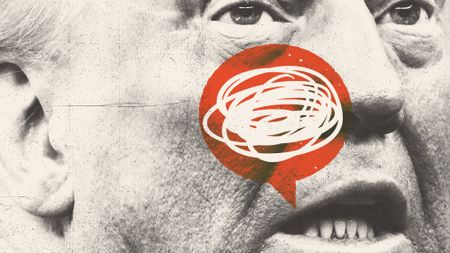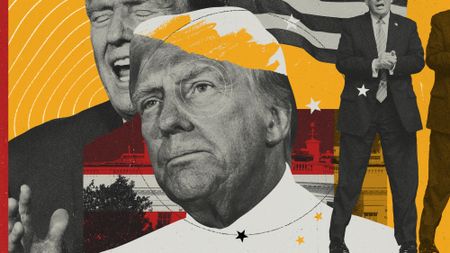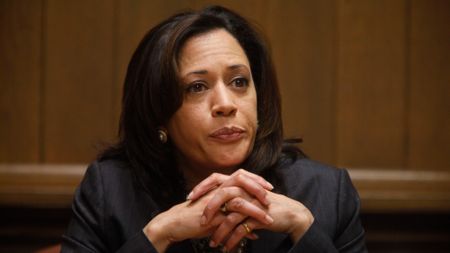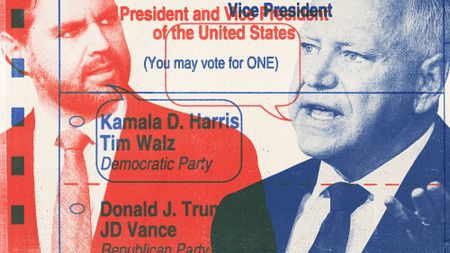How Trump is continuing the worst part of the Bush legacy
Team Trump is starting to resemble the gaggle of hangers-on and ideologues that George W. Bush sent to wreck Iraq


Since his election as the 45th president of the United States, Donald Trump has done his best to confirm liberals' worst fears, surrounding himself with Breitbart zealots, dodging security briefings, bringing his "blind trust" to meetings with foreign leaders and tech titans, briefly tanking the stock of Boeing with a bizarre and (of course) factually inaccurate tweet about the cost of Air Force One, refusing to divest himself of his business holdings, harassing The New York Times, attacking a local labor leader by name, and magically fast-tracking a series of Trump building projects in Turkey, Georgia, and Argentina after chatting with their leaders.
And then there's his Cabinet.
Team Trump is starting to resemble the gaggle of hangers-on and ideologues that George W. Bush sent to wreck Iraq in the form of the Coalition Provisional Authority. Remember, the first year of the Iraq War — the year that the whole thing was irretrievably lost — had two defining features. The first was a preference for bluster, bravado, and loyalty over actual expertise. The second was the Bush team's bizarre commitment to immediately transforming Iraq into a tax shelter on the Tigris.
Subscribe to The Week
Escape your echo chamber. Get the facts behind the news, plus analysis from multiple perspectives.

Sign up for The Week's Free Newsletters
From our morning news briefing to a weekly Good News Newsletter, get the best of The Week delivered directly to your inbox.
From our morning news briefing to a weekly Good News Newsletter, get the best of The Week delivered directly to your inbox.
Sound familiar? It should. Because both of these features are readily apparent in Trump and the dollar-store hucksters and cartoon billionaires with whom he is surrounding himself.
Like Trump and his cronies, Coalition Provisional Authority staffers got what little information they possessed from Fox News and shared right-wing Thinklandia's hostility to the career diplomats and analysts in the State Department, preferring instead to staff the CPA with movement conservatives. The leaders of America's Iraq fiasco infamously blundered into Baghdad having largely discarded the State Department's painstakingly detailed Future of Iraq Report, which predicted the insecurity that would plague post-war Iraq. State Department and NGO experts were "deemed too liberal" to participate in the Iraqi reconstruction project, as detailed by Rajiv Chandrasakaran in Imperial Life in the Emerald City. People with no experience in post-conflict situations, like former New York Police Commissioner and future tax felon Bernard Kerik, were preferred over eggheads with actual knowledge of Iraq or rebuilding broken societies. John Agresto, a woefully underprepared ideological hardliner tasked with rebuilding Iraq's 22-campus university system, told Chandrasakaran unapologetically that he deliberately read zero books before arriving in Baghdad.
And just like the Atlas Shrugged-thumping vultures about to take over Trump's departments of Education, Health and Human Services, and Housing and Urban Development, the Bush administration believed that the rigid application of orthodox free-market principles would magically heal Iraq's social and economic wounds. To lead the CPA, Bush appointed Paul Bremer, a retired diplomat with little meaningful background in Iraqi politics or society. What Bremer and Iraq's new viceroys saw when they surveyed the landscape from the commanding heights of the fortified Green Zone was a bloated public-sector bureaucracy that needed to be aggressively privatized to unleash the power of market capitalism in the Middle East.
Limits on foreign direct investment were obliterated. Tariffs were abolished. The CPA oversaw the implementation of a regressive 15 percent flat tax of the sort that drown-the-government-in-the-bathtub types have been scheming for in D.C. for decades. Tim Carney, the diplomat sent to run Iraq's Ministry of Industry and Minerals, and who, of course, had no experience with either, was shocked when he discovered that Bremer and the ideologues believed that all of Iraq's publicly owned companies should be swiftly privatized, in spite of the very clear laws of war prohibiting an occupying power from selling off state industries. Because Bush's wrecking crew believed government could be done on the cheap with minimal staffing, Carney was given two people to spin off all of Iraq's publicly owned enterprises in a matter of weeks. He quit after two months in disgust.
We know how this all ended. Things went so badly so quickly that the CPA was often referred to as "Can't Provide Anything." Ideological extremists with Big Ideas but no conceivable plan for how they would work in practice turned Iraq into a smoldering, strife-torn ruin. The CPA's inept, dogma-fueled decisions — including disbanding the Iraqi Army and aggressively firing thousands of civil servants — spiked unemployment and helped trigger the insurgency, whose veterans are now marauding around the region in the form of ISIS. Reconstruction efforts, which were supposed to be seamlessly paid for by Iraq's oil revenues, were chronically underfunded and understaffed across the board. Somehow our trillion-dollar occupation never even managed to get the electricity back on. Market zealotry was a massive failure in a centrally planned economy that would have needed a decade to restructure itself even in peacetime.
Trump's crowd shares the CPA's utter contempt for civilian public administration — hence a Cabinet full of lobbyists, oil executives, generals, and D.C.-luncheon-circuit true believers. Anyone who has had the misfortune of seeing their organization led by people with no administrative skill understands the costs of bad leadership. Many of Trump's nominees and advisers are not just inexperienced in the fields where they are now supposed to direct enormous American agencies or represent America to the world (Ben Carson, Nikki Haley, Rex Tillerson) but also dangerous extremists (Scott Pruitt, Michael Flynn, Steve Bannon, and Carson, again). Many have pushed radical theories of public education (Betsy DeVos), commerce (Scott Puzder), and foreign policy (Flynn, again), or are activists with long histories of opposing the whole mission of the agency they are being put in charge of (Rick Perry, and Pruitt, again).
The wreckage left by the American administration in Iraq is a good preview of what the Trump Coalition Provisional Authority has in store for the United States. Trump is clearly going to gleefully sell out his gullible white working-class base. But the destructive turn away from Obama-era policies on taxes, regulations, private prisons, criminal justice reform, minimum wages, worker protections, and fair housing policies is the least our worries. The longer-lasting damage is an accelerated decline in the state's capacity to govern — key functions will be farmed out to corporate rent-seekers, talented leaders will disappear from the public sector altogether, and institutional memory of proper processes will be obliterated agency by agency. The end result will be a government that fails to fulfill the core functions for which it was designed, worsens America's dire inequality crisis, and loses the little remaining faith of its citizens.
Bush's war planners naively thought that they could remake the Middle East in our image. At the end of four (or, God help us, eight) years of this kind of governance, America may look more like Iraq than the other way around.
And remember, no one responsible for the full-scale catastrophe of the Iraq War has ever paid any meaningful price for what they did. On the contrary, the war's blinkered architects disappeared into D.C.'s partisan waiting room — the network of right-leaning think tanks, lobbying shops, and consulting firms that provide a safe haven for out-party elites as they anticipate their next turn in power.
And here's something that should really unsettle you. Almost none of the guys who ruined Iraq have stepped up to take a position in the Trump Coalition Provisional Authority. Why? Because they rightly see it as a Baghdad-style hardship post.
Bush-era foreign policy hand Eliott Cohen's bombshell op-ed in The Washington Post advising conservative foreign policy elites to run for the hills is just the tip of the iceberg. When your administration is deemed too reckless and radioactive by the architects of the Iraq War, you're in serious, serious trouble.
Sign up for Today's Best Articles in your inbox
A free daily email with the biggest news stories of the day – and the best features from TheWeek.com
David Faris is an associate professor of political science at Roosevelt University and the author of It's Time to Fight Dirty: How Democrats Can Build a Lasting Majority in American Politics. He is a frequent contributor to Informed Comment, and his work has appeared in the Chicago Sun-Times, The Christian Science Monitor, and Indy Week.
-
 What does the Le Pen verdict mean for the future of French politics?
What does the Le Pen verdict mean for the future of French politics?TODAY'S BIG QUESTION Convicted of embezzlement and slapped with a five year ban on running for public office, where does arch-conservative Marine Le Pen go from here — and will the movement she leads follow?
By Rafi Schwartz, The Week US Published
-
 Discount stores were thriving. How did they stumble?
Discount stores were thriving. How did they stumble?The Explainer Blame Walmart — and inflation
By Joel Mathis, The Week US Published
-
 Kaja Kallas: the EU's new chief diplomat shaping the future of European defense
Kaja Kallas: the EU's new chief diplomat shaping the future of European defenseIn the Spotlight Former Estonian Prime Minister's status as an uncompromising Russia hawk has gone from liability to strength
By David Faris Published
-
 The JFK files: the truth at last?
The JFK files: the truth at last?In The Spotlight More than 64,000 previously classified documents relating the 1963 assassination of John F. Kennedy have been released by the Trump administration
By The Week Staff Published
-
 'Seriously, not literally': how should the world take Donald Trump?
'Seriously, not literally': how should the world take Donald Trump?Today's big question White House rhetoric and reality look likely to become increasingly blurred
By Sorcha Bradley, The Week UK Published
-
 Will Trump's 'madman' strategy pay off?
Will Trump's 'madman' strategy pay off?Today's Big Question Incoming US president likes to seem unpredictable but, this time round, world leaders could be wise to his playbook
By Sorcha Bradley, The Week UK Published
-
 Democrats vs. Republicans: who are the billionaires backing?
Democrats vs. Republicans: who are the billionaires backing?The Explainer Younger tech titans join 'boys' club throwing money and support' behind President Trump, while older plutocrats quietly rebuke new administration
By Harriet Marsden, The Week UK Published
-
 US election: where things stand with one week to go
US election: where things stand with one week to goThe Explainer Harris' lead in the polls has been narrowing in Trump's favour, but her campaign remains 'cautiously optimistic'
By Harriet Marsden, The Week UK Published
-
 Is Trump okay?
Is Trump okay?Today's Big Question Former president's mental fitness and alleged cognitive decline firmly back in the spotlight after 'bizarre' town hall event
By Harriet Marsden, The Week UK Published
-
 The life and times of Kamala Harris
The life and times of Kamala HarrisThe Explainer The vice-president is narrowly leading the race to become the next US president. How did she get to where she is now?
By The Week UK Published
-
 Will 'weirdly civil' VP debate move dial in US election?
Will 'weirdly civil' VP debate move dial in US election?Today's Big Question 'Diametrically opposed' candidates showed 'a lot of commonality' on some issues, but offered competing visions for America's future and democracy
By Harriet Marsden, The Week UK Published
